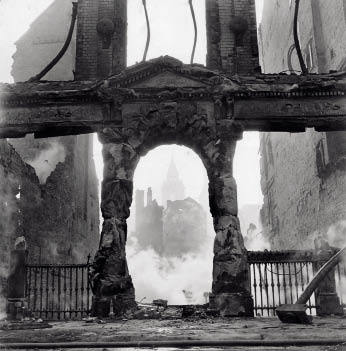Just as the slaughter in the trenches of Flanders and northern France gave birth to the tragic verses of Wilfred Owen, so the experience of bombing and being bombed between 1940 and 1945 generated its own major poetry in Britain and the USA. The scale of the catastrophe was vast: 55,000 of British Bomber Command aircrew, with an average age of 22, lost their lives, as did 60,000 British civilians roasted, suffocated, buried alive or blown to bits. German civilian deaths far exceeded this and have been estimated at around 580,000 (of these victims, more were women than men, and many were children), not to mention the millions of homes, churches and national monuments that were destroyed. As in the previous conflict, the devastation provided poets with new moral and physical landscapes: ‘In all this horror a brilliant, an insupportable, an inhuman beauty’ was how the writer Olaf Stapledon put it after the first world war.
One does not think of Dylan Thomas and T. S. Eliot as war poets, but Bomber County argues convincingly that it is in some of their very best work that they mourn the indiscriminate slaughter of the Blitz and the destruction of London. Other significant talents Professor Swift names are Cecil Day-Lewis (anticipating the bombing in pre- war verse and identifying the separate nature of airmen from that of the rest of mankind); Stephen Spender (as witness of the bombed German cities after the war), John Pudney (as a squadron intelligence officer mourning non-returning aircrews), Randall Jarrell (who went through all the stress of pilot-training, including fellow-pupils’ deaths that were an inevitable part of it); John Ciardi (as a rear gunner suffering from an hyper-active imagination on combat missions over the Pacific); and James Dickey (who flew as a radar observer, and whose poem ‘The Firebombing’ is an intensely powerful expression of guilt about killing civilians).
Bomber County’s closing chapter focuses on W. H. Auden’s ‘Musée des Beaux Arts’ (early 1939), and ‘Memorial for the City’ (1947), reflecting on the deadly dangers of man’s inventiveness, and the massive indifference of existence, human and inhuman, to suffering.
In setting the poetry of the air bombing in its pre-war and post-war contexts, and relating the works of war poets to their experience, Bomber County reminds one of Paul Fussell’s approach in The Great War and Modern Memory, a work still influential after over 30 years. Swift indeed acknowledges a debt to Fussell’s book, and Bomber County is quite as thought-provoking, besides being happily without Fussell’s sometimes patronising tone. The author has undertaken, on the whole successfully, a fascinating, if complicated, task of construction, weaving his literary vignettes and his moral and aesthetic reflections around the gradually unfurled story of his bomber pilot grandfather, Squadron Leader James Eric Swift DFC, killed returning from a night raid on Münster in July 1943 and virtually unknown to his grandson before research for the book began.
Bomber County is a poetical work in itself, evoking the atmosphere of wartime bases, of devastated towns and the ‘sea-flat landscape’ of the Dutch coast where the body of his grandfather was washed ashore. There are poignant encounters with bomber veterans and with Germans recalling the horrific raids on their cities. At one moment Swift dresses up in his grandfather’s RAF tunic, his fingers discovering a cigarette end in one of the pockets; and he describes being shown a photograph of the 24-year-old Luftwaffe ace, ‘thin-lipped with a parting, and an Iron Cross around his neck’, who is thought to have shot Swift’s grandfather down and was later himself killed.
S/Ldr Swift’s first operational service began in the spring of 1941 with a Wellington squadron at RAF Feltwell. After over 30 ‘ops’, he went to RAF Bassingbourn, as an instructor, but still on perilous combat missions. In 1943 he joined an élite path- finder squadron of Lancaster bombers marking enemy targets with incendiary bombs, calling for an exceptionally calm, methodical and determined temperament. His letters to his wife betray only a hint of stress.
Since the war, the pulverising of German cities has remained an embarrassment to Bomber Command which, unlike Fighter Command, has been without a major national memorial of its own — at least until now. Daniel Swift finds no conclusive evidence that his grandfather at any time queried the unsparing destruction. Had he lived into the last months of the war, when German defeat was certain, would he have approved of the firestorms created at Hamburg and Dresden? The assumption is that he would have carried out orders: aside from the conviction that the enemy must be defeated, the bombers felt a profound loyalty to their living comrades who shared the fearful risks of their missions, and to the courageous dead who had gone before them — the ‘Lost Airmen’ of Daniel’s Swift’s title: ‘I no longer felt an individual, but somehow part of a scheme, working almost automatically’, wrote tail-gunner Dick Rivaz in 1943, the year he died. This is not to say that all aircrew were free from private doubts about what they were doing. ‘And he is rising mad who searches there for meaning,’ wrote one airman-poet, Thomas Rahilly Hodgson, killed in May 1941, long before the first ‘Thousand Bomber’ raids began.





Comments